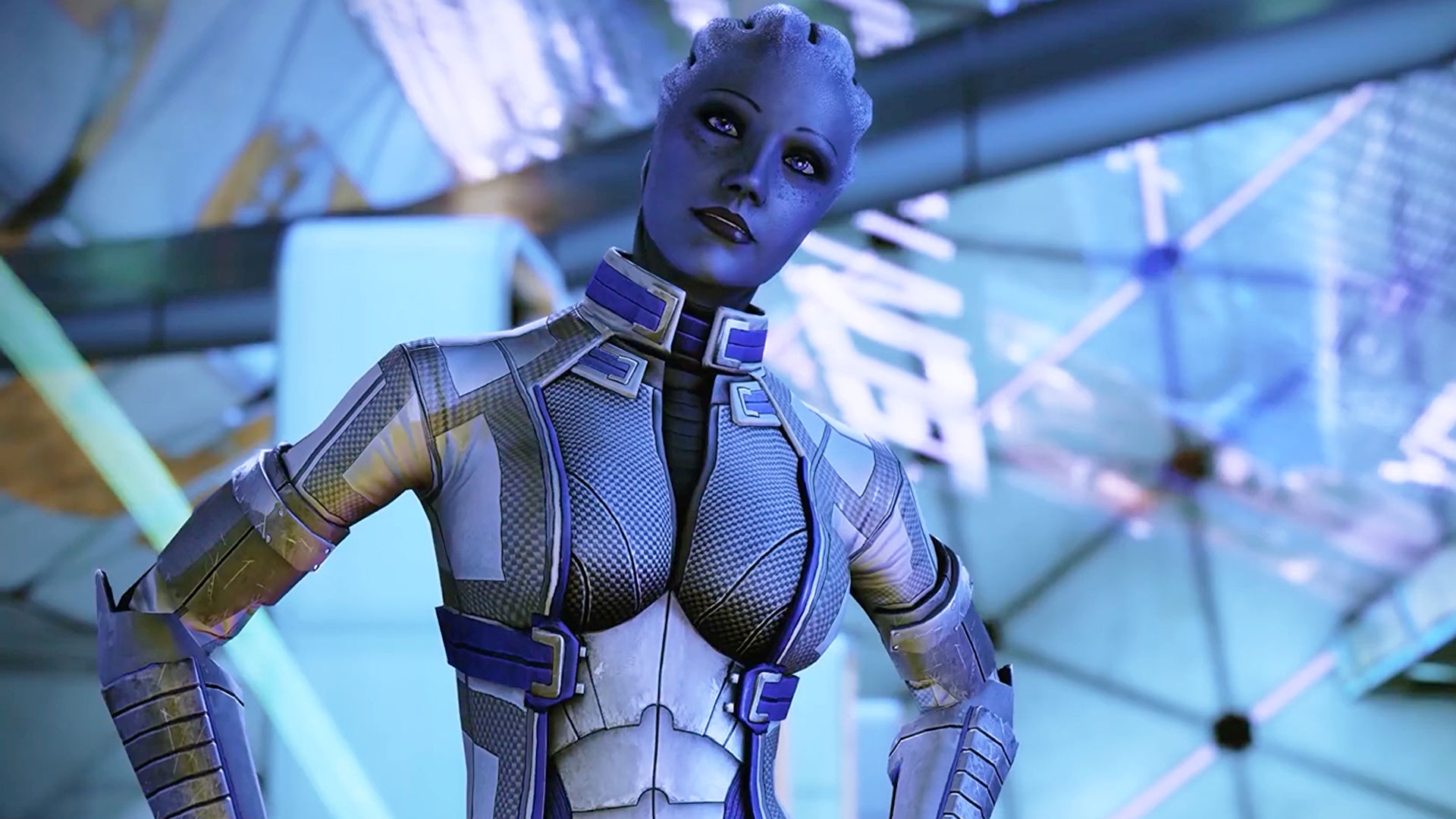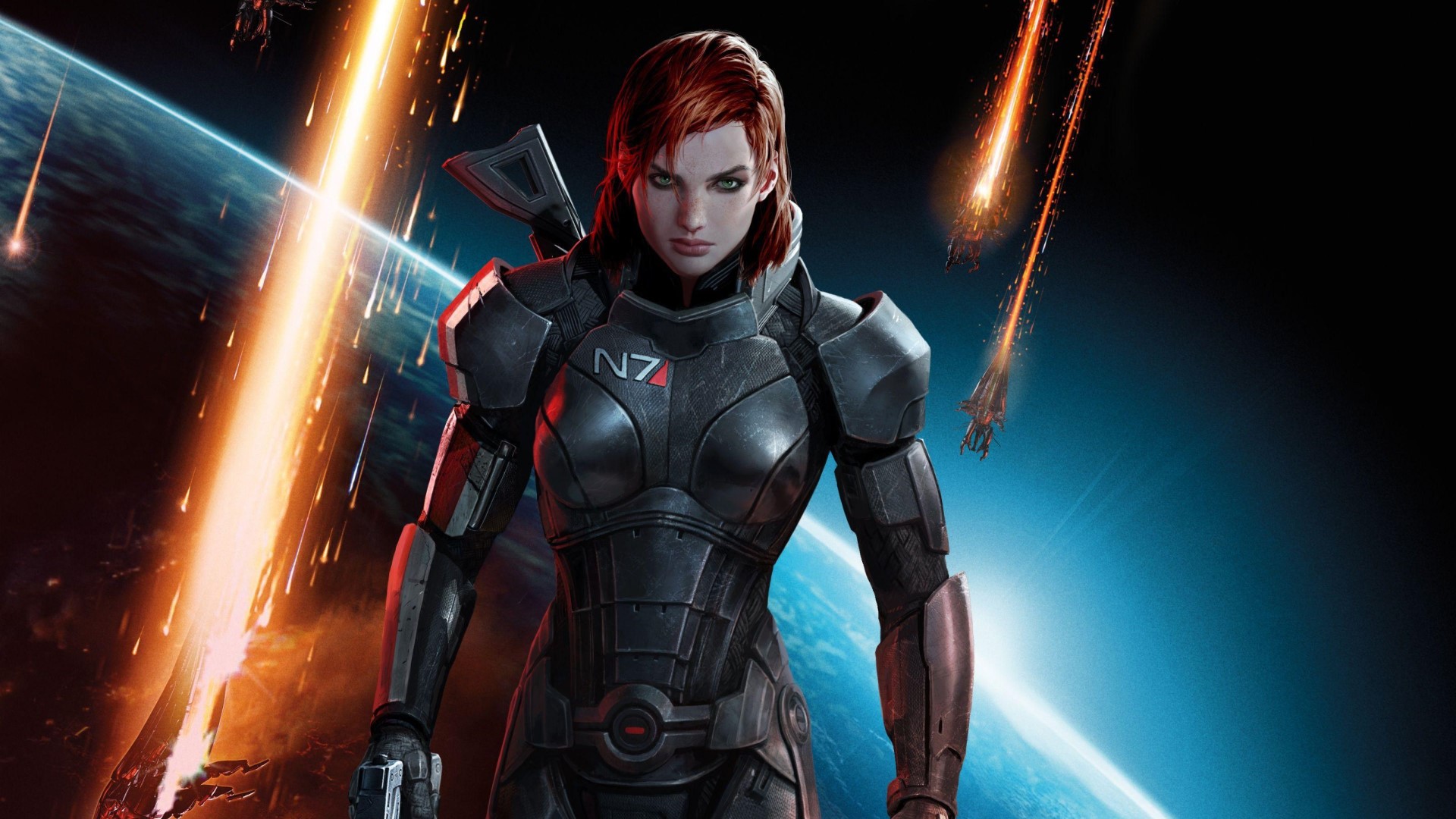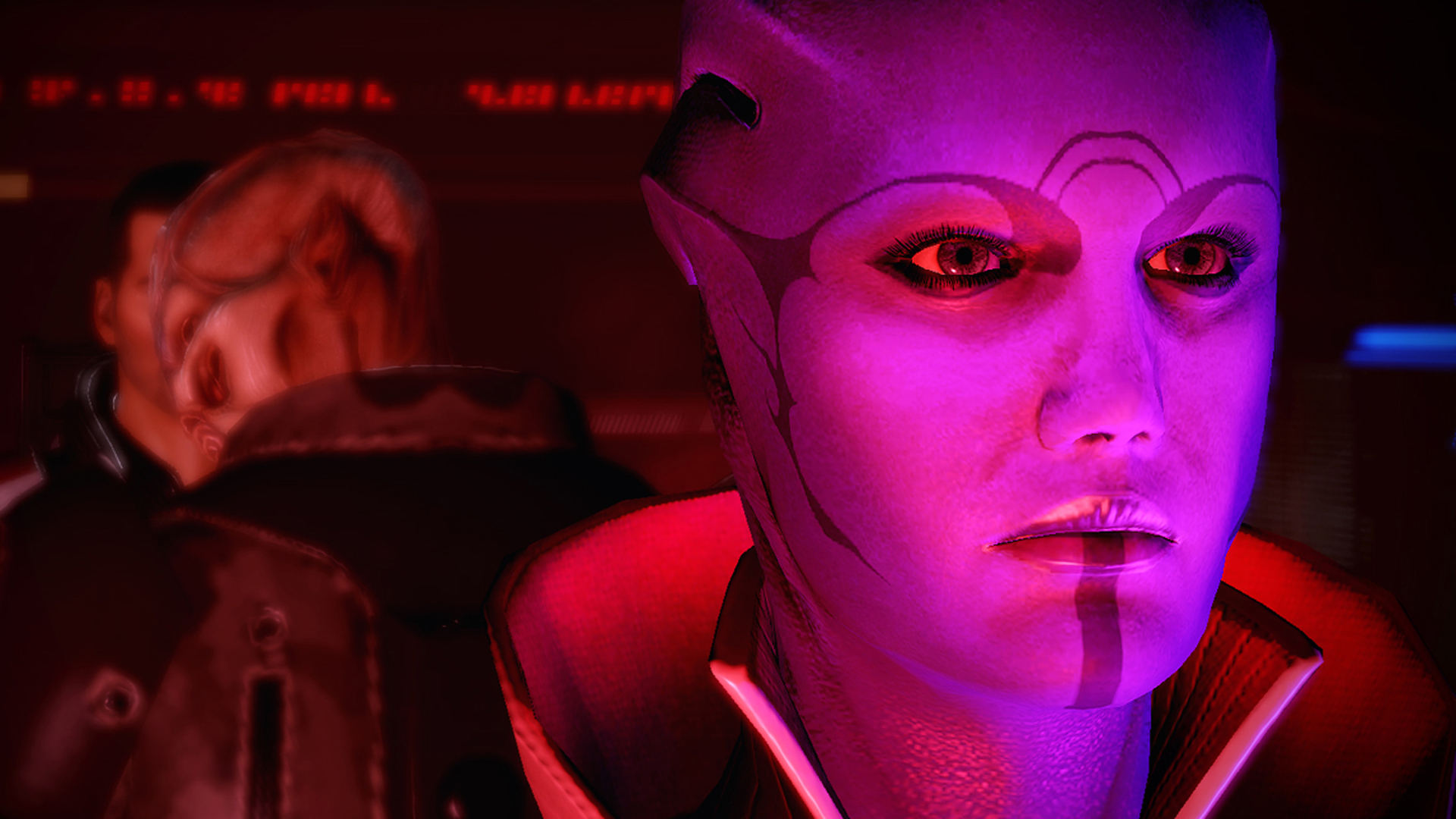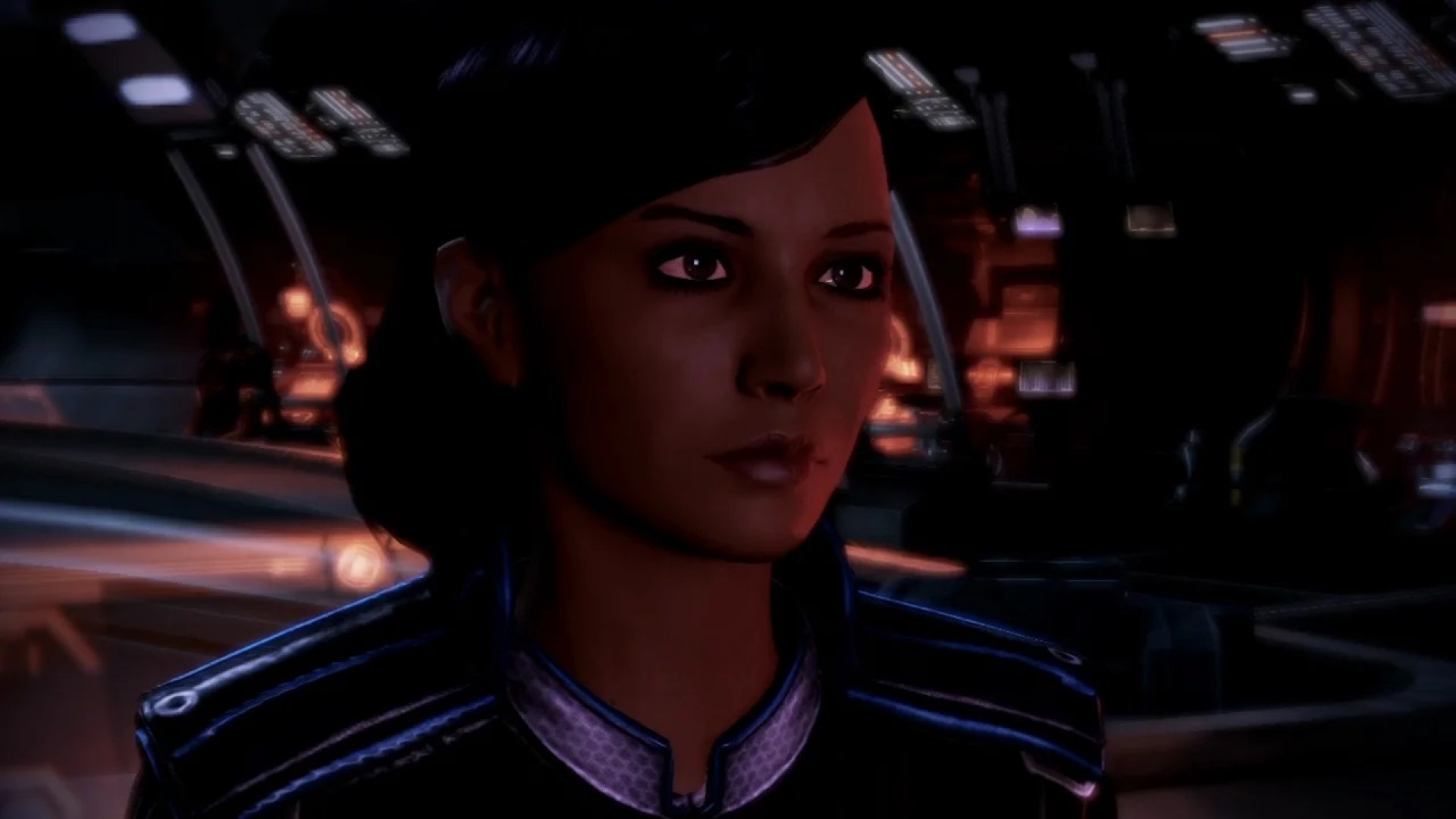
The original Mass Effect had cinematic ambitions, right down to the film grain option in the graphics menu. It was, in its every facet, an attempt to lovingly iterate upon the futurist space operas of the 60s and 70s through an unashamedly contemporary lens informed by modern classics like Battlestar Galactica. This commitment to modernity ushered in the grittier side of what the future of humanity might hold. Even amongst the stars, we still fall prey to ambition, fear, and prejudice.
Perhaps the jewel in the cinematic crown, however, was Mass Effect’s attempt at a more sophisticated exploration of relationships and sexualities. Some of Mass Effect’s relationships seem strained, almost forced by the standards of 2023. However, for its time, Bioware’s exploration of this space offered something truly novel – especially when it came to queer, feminist experiences.
In Mass Effect, a queer woman could save the galaxy. As a child growing up in rural Kent (the Texas of England), it blew my tiny mind. It points to the beginning of a transformation in female representation across video games. Though it wouldn’t be until Mass Effect 3 that ‘Femshep’ would be given equal billing in the game’s marketing material, it’s clear that queerness in the Mass Effect series paved the way for titles like Assassin’s Creed Odyssey. Commander Shepard crawled so Kassandra could run.
One small step for woman

The first Mass Effect’s cinematic aspirations were, in part, what elevated it beyond previous Bioware titles to a higher state of cultural visibility. Here was a game at the cutting edge of the medium, dedicated to providing you with a curated experience rooted in player choice. More than that, the game allowed you to make these choices through a character who you could make in your own image.
You, the player, build Commander Shepard. You decide their backstory, appearance, and, to some extent, their personality. The story of Mass Effect is one you and your bespoke character share. Thanks to the realization of these lofty goals, the experience Mass Effect provided is realized and legitimized through a lens of pop-culture prestige.
Mass Effect was an unprecedented mode of expression for marginalized groups who had rarely seen themselves reflected in video games before
For my teenage self, and perhaps many teenage selves across the world, this legitimization was a huge deal and helped cultivate the idea that video games could be a source of meaningful representation. Mass Effect was an unprecedented mode of expression for marginalized groups who had rarely seen themselves reflected in video games before.
Sex box

However, with boldness comes pushback. In January 2008, Mass Effect famously became a talking point on Fox News, The network famously used the fact that the game has tasteful sex scenes as an opportunity to both sling mud at the medium, and to voice their homophobic “concerns” about lesbian sex scenes in the game.
The fact that Mass Effect endured such harsh scrutiny demonstrates the bravery BioWare showed with its first entry in the series. The game was, in some senses, outwardly political – not only in its assertion that video games could be about relationships and sexuality, but also in its portrayal of a lesbian relationship as valid and legitimate.
Yet, it is fair to say that BioWare seemed cowed somewhat in Mass Effect 2. There were no gay male relationships and a very limited scope for lesbian romances. You could be murdered by a pansexual serial killer or have a creepy relationship with your secretary, but that was about it. Though the Lair of the Shadow Broker DLC did allow Shepards to continue their romance with Liara, the enthusiastic scientist introduced in the previous game, it appears that some of the bravery had been stifled.
The fact that Mass Effect endured such harsh scrutiny demonstrates the bravery BioWare showed with its first entry in the series
With Mass Effect 3, however, active queer representation was back on the menu. By 2012 the political landscape had changed sufficiently to ensure that the kind of backlash seen on Fox News four years earlier was unlikely to repeat itself to the same extent. Bioware added two new gay characters to the Normandy crew: specialist Samatha Traynor and shuttle pilot Steve Cortez.
An end, once and for all

This is not to say that the relationships in Mass Effect are without problems.
Only one queer romance option is available to Shepard in the first Mass Effect, and though groundbreaking at the time, the lack of a similar option for male Commander Shepards was conspicuous by its absence. Bioware has claimed that a gay relationship with Kaiden, one of the Normandy crew, wasn’t even planned – a sting gay men must have felt when playing the game. I remember, with amusement and sadness, a banner common on the Bioware forums at the time used by those who wanted a bit of gay Shepard in their lives. It read: “my Shepard is still waiting for his prince”. Thankfully, these prayers would be answered in Mass Effect 3, where Kaiden would become romanceable for male characters, alongside Cortez, who remains one of the most underrated NPCs in the trilogy as far as I’m concerned.
The formulaic nature of the romances, as well as the fact that Shepard is canoodling in a workplace, are causes for legitimate concern. However, I put it to you that it is only because of the path paved by Mass Effect that we are able to look at romances in games and demand more sophisticated and nuanced treatments of human relationships and sexuality.
The formulaic nature of the romances, as well as the fact that Shepard is canoodling in a workplace, are causes for legitimate concern
Though the original Mass Effect leaves an imperfect legacy, its contributions are undeniable. Even over the path of the trilogy itself, the series would eventually produce a host of wonderful, fleshed-out, queer characters while also allowing you to create your own character so as to reflect who you were as a person.
It is my hope that BioWare will allow players to express themselves even more broadly in future games; in ways that deconstruct binary ideas of gender and allow for a more earnest exploration of the wider spectrum of humanity. With any luck, this spirit will be alive and well in the upcoming title in BioWare's beloved fantasy setting: Dragon Age: Dreadwolf – a series that offered similar strides for LGBTQ representation in its time. Such scope for self-expression would certainly be in keeping with the spirit of Shepard and that first galactic adventure back in 2007.
Every day this week, TechRadar Gaming is running content celebrating Pride.







